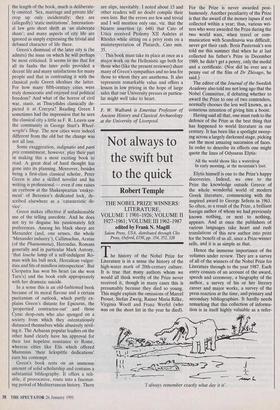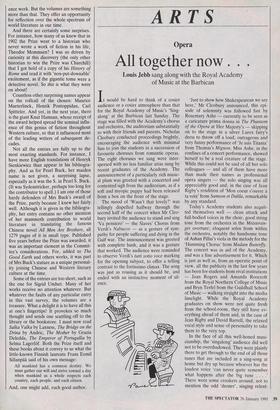Not always to the swift but to the quick
Robert Temple
THE NOBEL PRIZE WINNERS: LITERATURE, VOLUME 1 1901-1926; VOLUME II 1927-1961; VOLUME III 1962-1987 edited by Frank N. Magill
Salem Press, USA, distributed through Clio Press, Oxford, £150, pp. 334, 352, 328
The history of the Nobel Prize for Literature is in a sense the history of the high-water mark of 20th-century culture. It is true that many authors whom we would all think worthy of the Prize never received it, though in many cases this is presumably because they died so young. This might explain the omissions of Marcel Proust, Stefan Zweig, Rainer Maria Rilke, Virginia Woolf and Franz Werfel (who was on the short list in the year he died). For the Prize is never awarded post- humously. Another peculiarity of the Prize is that the award of the money lapses if not collected within a year; thus, various wri- ters who were awarded the Prize during the two world wars, when travel or com- munication with Scandinavia was difficult, never got their cash. Boris Pasternak's son told me this summer that when he at last collected his father's Prize in December 1989, he didn't get a penny, only the medal and a certificate. (Nor did he ever see a penny out of the film of Dr Zhivago, he said.) The editor of the Journal of the Swedish Academy also told me not long ago that the Nobel Committee, if debating whether to award the Prize to one of two contenders, normally chooses the less well known, as a conscious intention of giving him a boost.
Having said all that, one must rush to the defence of the Prize as the best thing that has happened to world literature in our century. It has been like a spotlight sweep- ing across a largely darkened stage, picking out the most amazing succession of faces. In order to describe its effects one might quote the lines of Odysseus Elytis: All the world shone like a waterdrop In early morning, at the mountain's foot.
Elytis himself is one to the Prize's happy discoveries. Indeed, we owe to the Prize the knowledge outside Greece of the whole wonderful world of modern Greek literature, commencing with the inspired award to George Seferis in 1963. So often, as a result of the Prize, a brilliant foreign author of whom we had previously known nothing, or next to nothing, appears. And at once the publishers of various languages take heart and rush' translations of this new author into print for the benefit of us all, since a Prize-winner sells, and it is as simple as that.
Hence the immense importance of the volumes under review. They are a survey of all of the winners of the Nobel Prize for Literature through to the year 1987. Each entry consists of an account of the award, speech and ceremony, a biography of the author, a survey of his or her literary career and major works, a survey of the press reaction at the time, and primary and secondary bibliographies. It hardly needs remarking that this collection of informa- tion is in itself highly valuable as a refer- `I always remember exactly what day it is'. ence work. But the volumes are something more than that. They offer an opportunity for reflection over the whole spectrum of world literature in our time.
And there are certainly some surprises. For instance, how many of us knew that in 1902 the Prize went to a historian who never wrote a work of fiction in his life, Theodor Mommsen? I was so driven by curiosity at this discovery (the only other historian to win the Prize was Churchill) that I got hold of a copy of his History of Rome and read it with 'non-put-downable' excitement, as if the gigantic tome were a detective novel. So this is what they were on about!
Countless other surprising names appear on the rollcall of the chosen: Maurice Maeterlinck, Henrik Pontoppidan, Carl Spitteler. And yet, in the next year, there is the giant Knut Hamsun, whose receipt of the award helped spread the seminal influ- ence of this genius of fiction throughout Western culture, so that it influenced most of the leading writers of subsequent de- cades.
Not all the entries are fully up to the most exacting standards. For instance, I have more English translations of Henryk Sienkiewicz than appear in his bibliogra- phy. And as for Pearl Buck, her maiden name is not given, a surprising lapse, especially as it was the S. in Pearl S. Buck. (It was Sydenstricker, perhaps too long for the contributor to spell.) I am one of those hardy defenders of Mrs Buck's award of the Prize, partly because I knew her fairly well. Although it is given in the bibliogra- phy, her entry contains no other mention of her mammoth contribution to world literature in translating the famous Chinese novel All Men Are Brothers, all 1279 pages of it in small type. Published five years before the Prize was awarded, it was an important element in the Commit- tee's considerations. For, added to The Good Earth and others works, it was part of Mrs Buck's stature as a unique personal- ity joining Chinese and Western literary culture at the time.
Some of the entries are too short, such as the one for Sigrid Undset. Many of her works receive no attention whatever. But whatever the faults of any particular entry in this vast survey, the volumes are a treasure. What a delight it is to have all this at one's fingertips! It provokes so much thought and sends one scuttling off to the library or the bookstore. I must now read Salka Valka by Laxness, The Bridge on the Drina by Andric, The Mother by Grazia Deledda, The Emperor of Portugallia by Selma Lagerlof. Both the Prize itself and these books about it convey to us what the little-known Finnish laureate Frans Eemil Sillanpaa said of his own message: All mankind has a common destiny. We must gather our will and strive toward a day when mankind as a whole respects each country, each people, and each citizen.
And, one might add, each good author.



























































 Previous page
Previous page